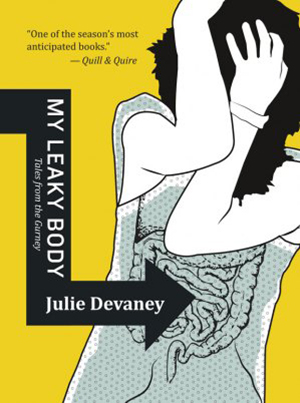My Leaky Body
By Julie Devaney
Published by Goose Lane Editions,
342 pages, $22.95
Reviewed by Jenny Aitken
It takes skill to centre an entire novel on bowel movements, and in My Leaky Body, Julie Devaney does just that. This memoir chronicles Devaney’s battle with ulcerative colitis, from her initial diagnosis to the surgery removing her large intestine years later. Devaney is unflinchingly honest about her inflammatory bowel disease, describing in detail the humiliating enemas, invasive treatments and the hours spent imprisoned in her own washroom.
I was hesitant to pick up this book, thinking, why would I want to read about that? The first few pages showed me I was wrong. Devaney’s conversational tone and dark humour makes her subject accessible, offering the reader an unfiltered view of her passage through the health-care system.
In her early twenties, Devaney attempts to juggle her diagnosis while dealing with the normal stresses of relationship, social life and grad school. Explaining her absences to professors, Devaney meets both hostility and suspicion. She worries, “I’m afraid that people will think I’m faking it – exaggerating to get attention – or, worse yet, that I’m actually ill and someone to be pitied.”
As her symptoms worsen, Devaney must decide whether to continue living in Vancouver or to move in with her family in Toronto: “I’m terrified of staying in Vancouver. But I’m even more afraid that people will be mad at me or judge me for giving up.” Although she wants to stay in school, the lack of support or understanding from her department make this impossible. After much pleading from her family, Devaney moves back to Toronto, acknowledging that she can’t be a full-time student when she is still a full-time patient.
Readers travel alongside Devaney through the overcrowded hospitals and frigid exam rooms. We are with her when she is left in a broom closet because there are no patient rooms available, or when a resident continues a procedure despite her screams that the drugs haven’t kicked in. We are outraged when she is accused of faking and exaggerating her pain, and shocked when she is left for eight hours after a surgery without being allowed to see a doctor or her family, and triumphant when she removes a tampon for a procedure in front of a disgusted medical student.
This memoir does not simply recount one dreadful medical challenge after another; instead we see Devaney when she is just being herself - planning her wedding, visiting her friends, enjoying DVD marathons and even starting to consider chronicling her experiences for this very memoir.
After finally receiving a surgery to remove her large intestine, Devaney questions how to feel sexy with a colostomy bag. Her insecurity builds until her husband makes love to her in a hospital shower.
Despite her harrowing experiences, Devaney remains good-natured throughout, never asking “Why me?” and instead focusing on how she can create positive change.
After recovering from her surgery, Devaney creates a critically acclaimed one -woman show; adorned in a patient’s robe, she recreates some of the most painful and humiliating moments of her life. Devaney also begins providing health-care workshops, to prod doctors and hospital staff to develop more respectful bedside manners.
Through her humour and frank honesty, Devaney demonstrates the importance of viewing patients as human beings rather than as broken bodies. This memoir is not just about illness, or the health-care system or therapy or love. It’s about all those things; it’s about being a patient without being a victim – and it’s about unceasingly rejecting the label “broken.”
Jenny Aitken is a UVic writing student
